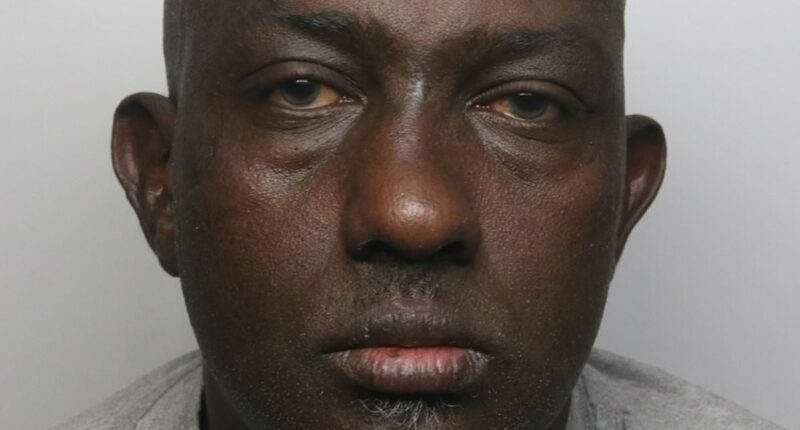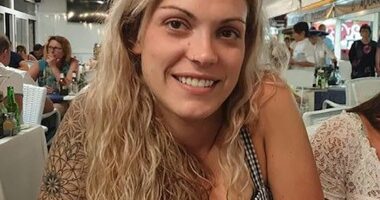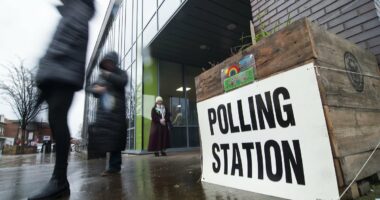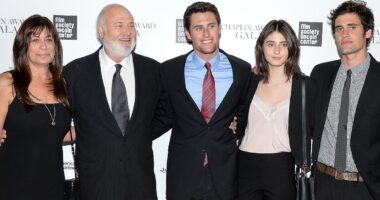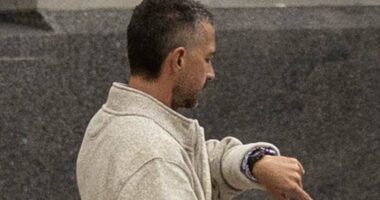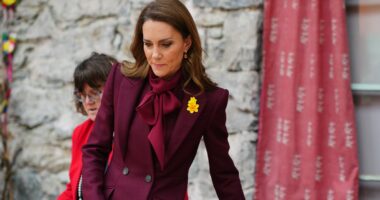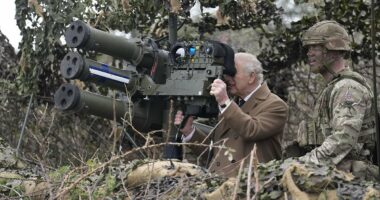Share this @internewscast.com
Their lives intersected for a mere 22 seconds on a seemingly ordinary afternoon at Lloyds Bank in Derby’s city center.
Gurvinder Johal, known as Danny to those close to him, was a 37-year-old father of three. He was in line to withdraw funds to cover the salaries of his restaurant’s employees.
Shortly thereafter, Haybe Cabdiraxmaan Nur entered the bank.
What unfolded next was likened by a judge to “a real-life horror film.” Surveillance footage showed Nur inexplicably brandishing a knife and stabbing Mr. Johal in the chest, simply because he happened to be the first person Nur saw upon entering the branch at 2:30 in the afternoon on May 6.
A few moments’ difference in timing, and the tragic outcome might have claimed another victim, highlighting the brutal randomness of Nur’s attack.
At the time, Mr. Johal was on FaceTime with a friend, who witnessed the horrifying moment of the stabbing and his subsequent collapse through her phone screen.
The explosion of violence that day – for which the perpetrator was jailed for at least 25 years this week – has become a feature of our towns and cities.
But the cold-blooded murder of Danny Johal also highlighted, in tragic microcosm, the contrasting impact immigration has had on this country.

Father-of-three Gurvinder Johal (pictured), 37 – Danny to his family and friends – was queuing to withdraw money to pay the wages of staff at his popular restaurant

Haybe Cabdiraxmaan Nur (pictured) arrived shortly after him
Mr Johal represented the very best of modern Britain. His killer was a failed Somalian asylum seeker.
‘I blame the Government for my son’s death,’ his father, Sukhdev Singh, fighting back tears, told the Daily Mail, a day after Nur was given a life sentence.
‘They should have kicked him out. He was a migrant with a criminal record.’
Mr Singh, 60, who is known as Sukh, came to Britain in the 1970s and made something of himself through hard graft, like countless others from the Indian subcontinent who have added immeasurably to the social, cultural and economic prosperity of Britain down the years.
He entered the hospitality industry and his family run three High Street establishments specialising in Punjabi cuisine, two in the West Midlands and one in the East Midlands.
Haybe Cabdiraxmaan Nur, on the other hand, was a grotesque caricature and the reason why immigration remains such an emotive and divisive subject.
A Channel migrant from Somalia with a history of offences across Europe – including assault, robbery, shoplifting, drunkenness and abusive behaviour – he had recently lost his asylum bid after arriving by small boat in October last year.
On the day he killed Mr Johal, enraged his application to remain had been rejected and in the process of appealing against deportation, he had downed three bottles of vodka. His eyes were bloodshot as he walked through the door of the bank.
It’s a chilling image.
The events which unfolded inside, and the preceding bureaucratic and legal obstacle course preventing him from being immediately returned to his homeland, given his criminal record, epitomises the wider scandal at the heart of this story.
Speaking about the tragedy for the first time, Mr Singh told the Daily Mail: ‘If the Prime Minister had done his job properly, my son would still be with us today.
‘It’s the Government’s fault. They have failed my family and they have failed other families.’
Successive governments, of both stripes, are equally culpable for the immigration crisis but it is Labour who have, until now at least, been the most in hock to human rights laws (the Prime Minister is a lifelong defender) undermining effective border controls.
So, Mr Singh’s anger, raw with grief and directed at the Labour leadership, is understandable.
The circumstances surrounding his son’s death, which emerged at Derby Crown Court this week, feel like a tipping point, the details coming, as they did, within days of a small-boat migrant being charged with murdering a dog walker during a triple stabbing in Uxbridge, west London, and another small-boat migrant being convicted of murdering a young woman in Walsall, West Midlands, who worked in the hotel he was staying in.
The fact that Danny Johal, a universally popular and respected member of the community, was himself from an immigrant family is the cruellest irony of all.

What happened next was described by a judge as ‘a real-life horror film’ because CCTV captured Nur suddenly pulling out a knife and thrusting it into Mr Johal’s chest. Pictured: Nur walking out of the bank after the attack

He did so for no other reason than he was the first person he encountered when he entered the branch at 2.30pm on May 6. Pictured: Nur, in lefthand circle, sitting at St Peter’s Cross in Derby before walking into the bank and killing Mr Johal, in righthand circle
‘A devoted husband, a loving father, a cherished brother and a loyal friend’ and ‘simply a good man’ is how his sister Sandeep poignantly described him in a victim impact statement read out in court by the prosecutor.
Mr Johal ran the Hen & Chickens Bar and Grill in the Shelton Lock area of Derby, which has won rave reviews on Tripadvisor for the quality of the curry dishes in particular (‘the best curry I have ever eaten’, ‘next level food’, ‘fantastic place’).
He spent £1.5million launching the eatery in 2020 after the success of two sister restaurants, one with the same name in West Bromwich and the other, the Bugle Horn in Rubery, near Birmingham, opened by his father more than a decade ago.
Father and son had a joint interest in all three establishments. The two ‘grill’ venues were former pubs. Danny, who would have been 38 last month, was also the director of a property company and a leisure company.
‘Danny was a grafter just like his dad,’ said his friend and fellow businessmen Ronnie Ghuman.
‘He was always well dressed. He liked nice jewellery and Rolex watches. But he was not flash. Everybody is devastated by what has happened.’
At the Hen & Chickens, staff spoke of someone who was ‘kind and caring’.
One said: ‘This is a tough industry. It’s fast and furious at times but Danny was a pleasure to work for.
‘He had done so well for himself following in his dad’s footsteps. He had a great work ethos, always hands on.’
Hard, at this point, not to compare Danny with the man who ended his life, who was the very opposite in every possible way.
Haybe Cabdiraxmaan Nur was born in Somalia, a failed state not so long ago, still riven with feuding warlords and militias, where violence and lawlessness is endemic.
His fiancee was executed by close relatives simply because she was from a different tribe.
The chain of events which ended in Lloyds Bank started when Nur paid €400 (£350) for a place on a small boat a year ago, money he had earned selling cigarettes illegally in camps in Italy and France.
He was, despite having a long criminal record, still walking the streets four months after he was formally refused asylum, which is par for the course.
His behaviour, regardless of his convictions in Europe, should have raised multiple red flags long before the murder of Mr Johal.
Shortly after Nur turned up in the UK – via Italy, Holland, Luxembourg and Germany, where he spent time in custody for robbery – he was heard shouting ‘f*** the English’ and ‘white racist bastards’, an incident which ended with him headbutting a construction worker. He was arrested but released without charge.

A few moments earlier or later and someone else would probably have died – such was the senseless wickedness of his random act of savagery. Pictured: Police at the scene in May
Nur was being put up at taxpayer-funded accommodation and was on the patient list of a local GP until he was removed for being aggressive and abusive at the surgery.
At his immigration accommodation in Derby, where he was bailed pending his appeal to remain, he was known as a heavy drinker (‘the only time I knew him not to be drinking would be when he was asleep,’ a witness statement submitted during his court case revealed) and a troublemaker.
Still, no action was taken against him. Less than two hours before the fatal attack, he called a migrant charity, saying he was going to kill ‘500 people’, later suggesting he was going to target ‘doctors, police or people working at the Home Office.’
Still, he was left on the street.
This was the background of the crazed figure who walked into the St Peter’s Street branch of Lloyds bank in Derby that terrible day where customers would witness a ‘very public killing’ (the judge’s words).
Danny Johal was from a different world, the product of a loving, close-knit immigrant family, who all lived together.
He and his Indian-born wife, their three children (a boy and two girls, aged six, three and one) and his parents shared the same inter-generational home in West Bromwich.
‘We were the typical immigrant family coming from a country with nothing, at that time, to a country offering everything if you worked hard,’ said Mr Singh.
‘We wanted to work. We worked so hard. I did not expect to live off the state, which I find totally shocking.’
He was nine when he arrived here with his parents in 1975. Originally from the north-western Indian state of Punjab, they had sought a future in Britain.
Mr Singh’s father was a foundry worker, his mother was employed in a factory. He himself once worked part-time at a pub in the Handsworth district of Birmingham.
‘Why am I not doing this for myself, I thought,’ he recalled. ‘Why isn’t this my pub? If anyone can do this, we can.
‘We came to Britain to build a better life, and we succeeded.’
That paved the way to his future as a businessman – and later with his son – in the pub and dining industry.
‘He was a good boy, a good restaurant manager and owner,’ Mr Singh told the Daily Mail, paying tribute to his son. ‘Everyone says how good he was to work for.
‘He should still be here, working and providing for his family and enjoying life. I miss him, I miss everything about my son.’
Every word he spoke is a reminder of the injustice which took him because it should never have happened.
‘The murder has inevitably taken its toll on all the family,’ Mr Singh said. ‘We are doing our best to carry on. We have no choice, there is no choice.’
In her statement, his daughter explained in searing, visceral detail what such a toll really means.
‘The deepest wound of all is the impact on Gurvinder’s children,’ she wrote. ‘Their innocence has been stolen.
‘Once carefree and joyful, they are now withdrawn, fearful and confused.
‘They ask, “When is Daddy coming back?” And we are left with the impossible task of explaining that he is never coming back.
‘How do you tell a child that their father has been taken from them for ever.’
‘I have always been proud to call Britain my home,’ added Mr Singh. ‘Sadly, I don’t think there is a future in this country any more.’
The unvarnished truth is that Gurvinder ‘Danny’ Johal should still be alive because he and Haybe Cabdiraxmaan Nur should never have met, not even for 22 seconds.
Additional reporting by Tim Stewart
